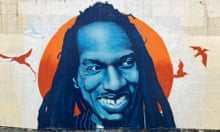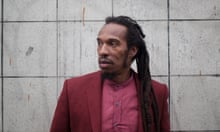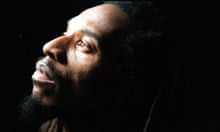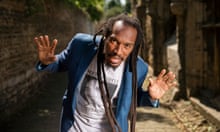Benjamin Zephaniah’s 1998 poem Carnival Days is a lyrical love letter to the Notting Hill carnival, where “We dance like true survivors / We dance to the sounds of our dreams.” Or, more accurately, it’s a love letter to what the carnival once was. He still supports the event, which takes place in London this weekend, and plans to be there on Monday, but reckons it has become less innocent, less spontaneous in the two decades since he wrote his poem. These days, even dreams have to be policed – and ideally sponsored.
“It’s become more corporate and – to some people this might sound positive – more organised,” he says. “Stalls have to pay a fee; sponsors get involved. People used to take to the streets and do it for themselves. They’d say: ‘I’ll sell some food on this corner; you sell some food on that corner.’ It was organised anarchy. There was no big committee. There was a group of people and that was it. Now, it’s all about liaising with the police, which for me takes away the spirit of us really taking to the streets. The idea that we are in control, that we run things, that the authorities have nothing to do with this and the police have to stay out there – that’s gone.”
Zephaniah says the carnival had a particular resonance in the late 1970s and 80s, when he became a regular attender and started performing his poetry there, because “there were no jobs for young black people and there were places we couldn’t go because of the NF or the way they [those places] were policed. The idea of carnival was to say: ‘These are our streets now, just for this long weekend. It was a celebration, but it was also a political statement. The carnival can’t happen in a park, as some people have suggested. That’s a concert.”
He has been irked by the police crackdown on people they claim are out to cause trouble at the event? “It’s just an excuse,” he says. “If they are arresting people because they suspect they have knives and guns, I’m sure these people will have knives and guns all year round. There’s been no major shoot-out at the carnival; there have been a few scraps, but those scraps would have happened anyway. It happens when someone has a grudge against someone else. It happened to a friend of mine. He met someone at the carnival who had a grudge against him and they had a scrap, but it would have happened if they’d met at Spitalfields market.”
The other controversy surrounding this year’s event has been the police’s proposed use of facial recognition software to identify supposed troublemakers. Zephaniah says the carnival has always been used by the police to test new equipment. “This, for them, is perfect,” he says. “A lot of people, mainly black, in one place.” He claims long-range listening devices were tried out at previous events.
Zephaniah, as his argument suggests, is a fan of organised anarchy. “Deep down, I am a revolutionary,” he says on his new album Revolutionary Minds, his first foray into music for a decade. It is a little difficult to take this claim seriously when we meet in a tea room next to Peterborough cathedral on a gloriously sunny day, especially when Zephaniah – a lover of martial arts who treats his body as a temple – orders ginger beer. But he insists he’s serious.
“I have no faith in the political system as it is,” he says. “I’ve voted, but it’s always for the least of the evils. On that track [called I Am a Revolutionary”], I say I go on Question Time and I talk to politicians and get involved, but actually I’d like to just burn the lot of them. The system stinks.” The young man who came of age amid the edgy street politics of the 1980s is still furious about the state of the world. “I can’t understand why I’m almost 60, and I’m still fucking angry. Everyone told me I was going to be mellow by now. I’ve got a house, I grow my own vegetables, and I’m still angry.”
Last year he waded into the debate over Jeremy Corbyn, defending him against critics in both the media and his own party, but he demurs when I describe him as a “Corbyn fan”. “It’s not about being a Corbyn fan,” he says. “It’s not about the cult of personality. Corbyn is not even, in my view, a very charismatic speaker. People laugh at him sometimes, and say he sounds like a teacher, and he does, but what he says makes sense. It’s not about worshipping him; it’s about being desperate for something different. In terms of mainstream politics, he’s the best thing that’s happened here for a long time.”
Zephaniah has been vocal about the treatment of the residents of Grenfell Tower, and criticised Kensington and Chelsea council for ignoring their plight in the aftermath of the fire. “What happened is a symbol of a divided Britain,” he says. “These people were abandoned for days, absolutely abandoned, at a time when they needed help the most.” The tragedy will form the backdrop to this year’s carnival: attendees are being encouraged to wear green in sympathy with those who died; there will be a quiet zone for reflection; and sound systems will fall silent as they pass close to the tower.
In Zephaniah’s view, everything is political. He quotes Jamaican poet Elean Thomas: “I am not one of those people that say: ‘I don’t deal with politics.’ Because if I don’t deal with politics, politricks will deal with me.
“One of the things I’m really good at,” he says, “is talking about politics and ideas to people who are not interested in it for one reason or another. They don’t think it’s for them, but usually I can explain why it is.” He says his poetry performs the same function. “I said something once that still stands: I started writing poetry because I don’t like poetry. Of course I liked using words, but I wanted to change the image of poetry. I wanted to bring it to life and talk about now and what was happening to us.”
It was writing and performing poetry that allowed him to escape a difficult background. His parents, who were born in the Caribbean and emigrated to the UK in the 1950s, had separated; his large family had split and he lived with his mother; he fell in with a gang in Handsworth, the heart of the African-Caribbean community in Birmingham where he grew up, was sent to borstal for robbery, and by his early 20s feared for his life. “There were some people in Birmingham out to kill me,” he says, “and the police were also buzzing around. I watched about three people die, and thought, ‘What’s so special about me that I’m going to survive this?’ So I got up one morning and went to London. I told my mum: ‘The next time you see me it’s going to be on TV.’ She laughed and said, ‘Yeah, you’ll be on Police Five.’”
Gangs are a curse, he says, but they also reflect human nature. “People are pack animals. We like our gangs. That’s the way we are. When I talk to kids, I tell them about me growing up in gangs in Birmingham and how one day I got up and I went to London and I got involved in another gang and these were a real hard lot. All these kids are listening to me, and they go ‘Oh, you poor thing.’ And I go, ‘It was a gang of poets and painters,’ and they all laugh.”
He had always wanted to be a writer, despite the fact that he was dyslexic and that some of his friends told him writing books – as opposed to rapping in clubs, which he excelled at as a teenager – was “a white-man thing”. “When I was eight I knew what I wanted to do. I wanted to be a poet, and earn a living from it. I wanted to write poetry that was serious but could be funny; to put some stories into novels; and to talk about peace and freedom. I always felt that I was never going to be top of the pops, because I wouldn’t be completely accepted by everybody, and all that stuff has come true.” He is writing his autobiography, due to be published next year when he will turn 60; it should be a vivid read.
He accepts that he is now part of the cultural establishment, but says he will never be part of the political establishment. “I can’t go to a bookshop and say ‘Please can you sell less of my books.’ But what I can’t do very well is sip champagne. Three or four times I got offers to go to one of those Blair parties and to Buckingham Palace [he turned down an OBE in 2003], but I can’t do that shit. I just can’t do it. I’m not establishment in that sense. I can’t spend time with them; I can’t even have sex with them; I have to go home on my own.”
Being on his own is part of the Zephaniah mystique. We are meeting in Peterborough because he lives in a village in the Fens near Spalding – about as far as imaginable culturally from the Handsworth of his youth and the London that formed him politically. He likes the isolation and not being part of the London scene. “I wanted to go to a place that wasn’t known for its artistic community. People are just getting on with life.” He also finds it amusing that black people in Peterborough complain to him about eastern Europeans not speaking English and taking all the jobs. The demonisation of the other – one of his pet hates – is a universal affliction.
Zephaniah admits working across so many genres – poetry, fiction, plays, music – confuses people. “A lot of people have said to me: ‘If you really knuckled down you could be a great novelist’. And other people have said: ‘If you concentrated on your music, you’d be the next Bob Marley’. But jumping from one to another, I’m never bored. People who don’t know me sometimes stop me and ask me what I do, and a lot of the time I say I’m a painter and decorator who does a bit of poetry on the side.”
Revolutionary Minds is out on 1 September.










Comments (…)
Sign in or create your Guardian account to join the discussion